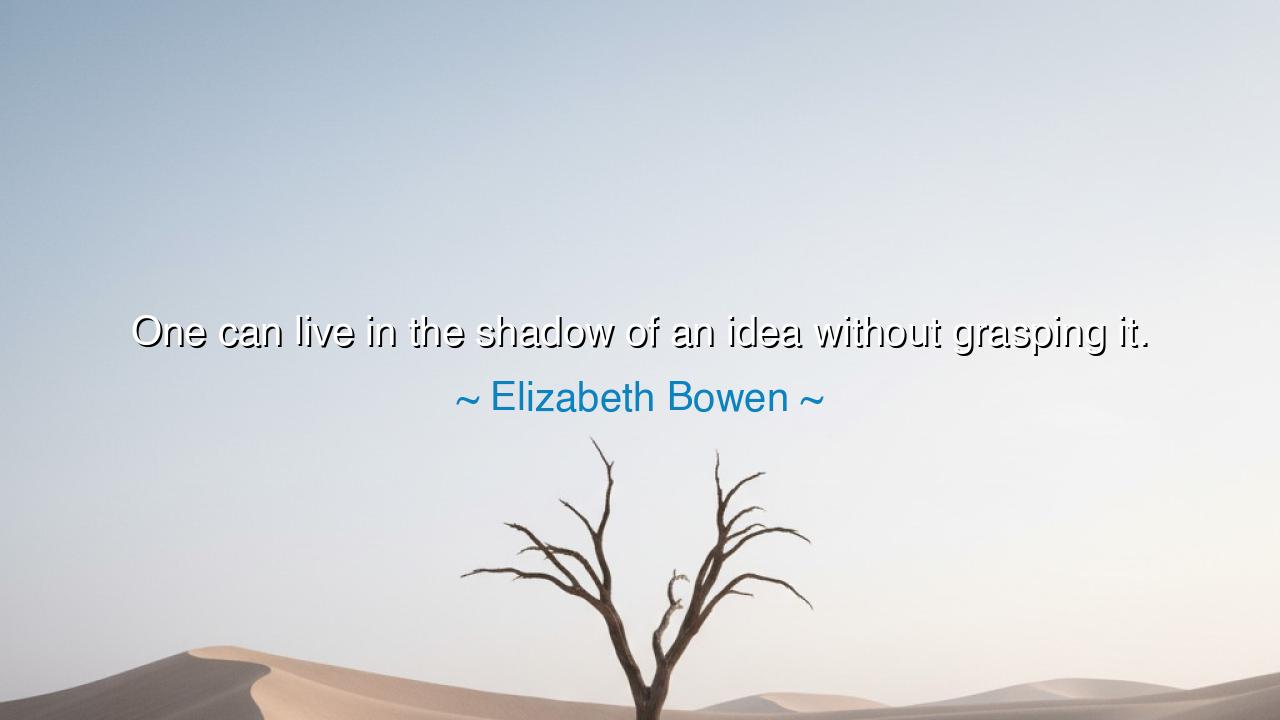
One can live in the shadow of an idea without grasping it.






The novelist and keen observer of the human soul, Elizabeth Bowen, once wrote: “One can live in the shadow of an idea without grasping it.” In this haunting and luminous thought lies a revelation about the way human beings dwell among truths without understanding them, how they may walk beneath the light of wisdom yet remain untouched by its warmth. Bowen, who lived through the storms of the twentieth century—the wars, the disillusionments, the changing of worlds—saw that people often cling to ideas not as living truths, but as idols of habit, shadows cast by something brighter than they dare to face. To live in the shadow of an idea is to be surrounded by meaning, yet not awakened to it; it is to breathe the air of truth without ever tasting it.
This quote speaks to the human tendency to repeat, adopt, or believe ideas without truly understanding them. Many live beneath the banner of faith, freedom, love, or justice, but few have truly grasped what those words mean. They inherit these grand ideas from parents, teachers, nations, or traditions, and live within their shadow, mistaking reflection for reality. The shadow comforts them—it provides identity, belonging, and the illusion of comprehension. Yet a shadow, though shaped like truth, is not truth itself. It is the echo, not the voice. Bowen’s words are therefore not condemnation, but a quiet plea: to step out from the dimness of borrowed thought and into the radiance of understanding.
Consider the story of Niccolò Copernicus, who lived at a time when the shadow of an old idea—that the Earth stood still at the center of creation—darkened all of Europe. For centuries, humanity lived within that shadow, teaching it, defending it, and killing for it, without ever questioning its shape. It was not malice that held them there, but comfort; the idea had become a home. Yet Copernicus, daring to look directly at the heavens, grasped what others only recited: that the Earth moves, that truth is not what men decree, but what reality reveals. He stepped beyond the shadow and saw the living light of the universe—and in doing so, changed the very rhythm of human thought.
So too in our private lives we dwell beneath the shadows of ideas—the idea of happiness, of success, of love. We imagine that to acquire wealth is to live well, that to marry is to know love, that to believe is to have faith. Yet these are often only shadows, outlines cast by the deeper realities we have not dared to explore. True happiness is not in possession, but in contentment; true love is not in comfort, but in understanding; true faith is not in words, but in the quiet endurance of the spirit. To grasp the idea requires labor, humility, and sometimes pain. It asks that we see ourselves truthfully, and this is the hardest of all tasks.
There is danger in living forever beneath the shadow. For shadows are safe—they demand no transformation. One can speak eloquently about freedom while living in fear, preach compassion while harboring resentment, praise truth while hiding behind falsehood. But to grasp an idea is to be changed by it, to let it burn away illusion and pride. The ancient mystics understood this well. They warned that enlightenment is not the gaining of knowledge, but the losing of falsehood. One who lives in the shadow of an idea believes he knows; one who grasps it knows that he does not.
Yet, Bowen’s insight carries not despair, but invitation. The shadow means that light is near. To dwell in its presence is to stand on the threshold of understanding. The question is whether we will remain comfortable beneath its coolness or step forward into the brilliance that might blind us for a moment, but then reveal the true form of things. Every generation faces this choice—whether to live in the echo of inherited wisdom or to wrestle with it until it becomes one’s own. The former is ease; the latter is awakening.
So, my listener, take this teaching into your heart: do not live only beneath the shadow of ideas. Seek to grasp them, even if your hands tremble. When you hear of virtue, practice it. When you speak of love, examine whether you live it. When you claim truth, dare to test it. For ideas are not ornaments to adorn the mind, but fires to transform the soul. The shadow is the beginning of wisdom—but only those who walk beyond it will find the light.
Thus, Elizabeth Bowen’s words stand as both mirror and challenge. To live in the shadow is easy; to grasp the idea is divine. Step forward, then, from the safety of the outline into the peril and beauty of truth itself—and in doing so, you will not only see the world more clearly, but live more deeply within it.






AAdministratorAdministrator
Welcome, honored guests. Please leave a comment, we will respond soon